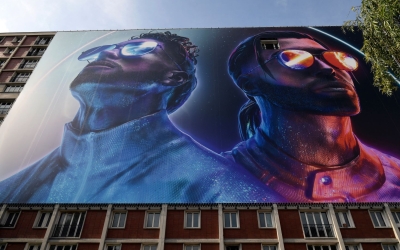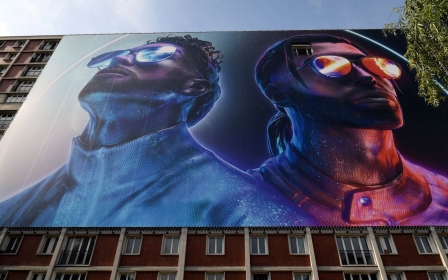Rapper's delight: Against the odds Lebanon's rap artists are having a breakout moment

At a music festival in June in the northern Lebanese town of El-Mina, the rapper Mazen el-Sayed, aka El Rass, managed the unthinkable: he drew a crowd of more than 300 people.
In Lebanon, where rap music has never truly taken off, even among young people, such a turnout was quite the feat.
El Rass has been active on the Lebanese rap scene for 15 years and his reputation today has spread far beyond. Outsiders refer to him as “The Lebanese rapper”.
The artist was the only Lebanese performer featured in the 16 July mega concert in Beirut organised by the Arab Fund for Arts and Culture (AFAC) to celebrate its 15th anniversary. He appeared alongside other big names from the Middle East music scene, like the Egyptian artist Wegz.
The inclusion of rap in the event reflects the Lebanese public’s fledgling but growing interest in the genre.
According to the 27-year-old rapper and producer, Antoine Berberi: “A lot has changed in Lebanon since the 17 October Revolution.”
Namely, the emergence of a young generation of rappers, including Omar Adawie, Antoine Berberi, Hayek, Tarek S Kassar, Roytivation, Sabine Salame, Youssef Sayouf and Ziggy Stoner.
Each, in their own way, is attempting to break through the glass ceiling that has long kept them on the sidelines.
“It used to be really hard to get people to come to your gigs. Even your own friends were reluctant. Today, it’s insane: even the slightest open MC draws a crowd,” Berberi says with enthusiasm.
Underground movement
Rap music is nothing new in Lebanon, with the group Aks’ser (Wrong Way) paving the way as far back as 1997.
Next came DJ Lethal Skillz, the Fareeq El Atrash Collective and Wael Koudaih, aka Rayess Bek, who went solo after the disbanding of the Aks’ser, of which he was a member.
“The years 2008 to 2015-16 saw the golden age,” the former rapper Salim Saab, aka Royal S, tells Middle East Eye.
“At the time, there was a proliferation of concerts, events, and truly distinctive groups,” says Saab, who now works as a journalist.
'Social protest is in the rap DNA. And yet, it wasn’t heard in the streets during the thawra [revolution]'
- Sabine Salame, rap artist
The fire, nonetheless, had trouble catching. Rap remains a relatively underground genre in Lebanon, where mainstream popular music is represented by artists like the diva Fairuz or the Rahbani Brothers.
Elsewhere in the Arab world, the genre has gone mainstream, such as in Egypt, Algeria and Morocco. The prospect of tapping into a market of potentially hundreds of millions of people is whetting the appetite of labels like Warner Music, which opened a branch in Beirut in 2018 hoping to discover new talents.
Yet even the thawra, the protest movement that set Lebanon ablaze in 2019, was unable to become a breakout moment for the genre in Lebanon.
“Social protest is in the rap DNA, and yet, it wasn’t heard in the streets during the thawra [revolution] like it was, for example, in Algeria during the hirak, the popular uprisings of 2019. Lebanese street artists were a much louder voice,” rap artist Sabine Salame tells MEE.
The crisis is the message
One figure who did emerge as the “voice of the revolution” was DJ Madi K from Tripoli; real name Mahdi Karime.
Madi K remixed familiar tunes to get protesters dancing, first at El-Nour Square in Tripoli, and later at Martyrs Place in Beirut.
“Rap music was heard at the marches, of course," says the 28-year-old rapper Omar Adawie. He adds: "The events even inspired us to release our own songs. But the movement didn’t have the snowball effect we were hoping for.”
But all that could change, with the profound socio-economic crisis that has shaken Lebanon for nearly three years now.
With the country's situation going from bad to worse, rap has emerged as the perfect vehicle for encapsulating the country’s many ills, from the endemic corruption and lack of accountability of the country’s elite, to the hardships endured by ordinary citizens.
A number of artists have released songs directly addressing the country's problems, including Egyptian performer Ramy Essam, who released the single Mafi Mafi Khod (There's nothing, go f**k yourself) in May 2022, preceding the Lebanese elections.
Released in collaboration with Lebanese artists, the lyrics state: “There is nothing, no water, no food, no internet, no electricity… No gasoline, no butane, no medicine, no security, no money, nothing… Go f**k yourself."
The Lebanese stand-up comedian and activist Shaden Fakih, aka Lil Shadz, also released a provocative music video in which she belts out her own invective against the state.
Her lyrics take direct aim at the politicians “clinging to power” and the religious elite “protecting criminals and the dead, whereas the living want nothing to do with them”.
In a clever mix of dialect and classical Arabic, Fakih lays down vocals denouncing “a culture of patriarchy and harassment” and the ruling elite’s systematic denial of the very real problems plaguing Lebanon.
“All they care about is keeping the virginity of women intact and thereby ‘keeping Satan at bay.’ Dirty bastards! Stop threatening us, stop locking us up, fuck off!”
The outspoken advocate for free speech and the rights of women and minorities was recently fined by a military court hearing for undermining the prestige of the security forces.
In just three months, her video has picked up more than 150,000 YouTube views.
Hardly anything to write home about, compared with Wegz’s most recent YouTube release, which received 16 million views. But for a Lebanese track, it remains a promising achievement.
Denouncing the manzoume - the system “that kills its own people” is what distinguishes the emerging generation of artists from their elders, according to Berberi.
“Rap is the voice that harnesses our anger. I lost my job in the early days of the crisis. I almost lost my life in the Beirut explosion. I had to move back in with my parents because I couldn’t pay the rent... Criticism alone is no longer enough,” Berberi continues.
The raw and indignant undercurrents of “street rap” are a more direct reflection of the regime’s brutal political hold over the people.
“Anyhow, what can the politicians do? Throw us in jail? It would only make us famous,” he says with a smile.
Fragile foundations
The emergence of a new generation of artists does not mean that the Lebanese rap scene has firmly taken root. Structural problems, including very limited financing possibilities, are still big obstacles to rap's success.
“When we started, we had no help whatsoever, either logistical or human. We stole our first mic at the mosque. We were young, but we had to figure it all out on our own. We still do. It’s exhausting,” Adawie tells MEE.
According to Nasser Shorbaji, aka Chyno, this sense of struggle against the odds is not surprising.
The Lebanon-based, Syrian-Filipino rapper is one of the few artists to have signed with a major, Warner Music in 2020. Only the Jordanian-Palestinian artist, Laith Hasan, known as The Synaptik, has achieved similar success.
“The country has a mere six million inhabitants, so it is difficult for a ‘music scene’ to take root, especially in the middle of an economic crisis.
"That’s why we have to focus on exporting our music to the Lebanese diaspora and the Arab world,” Shorbaji, the founder of The Arena ME, the Middle East’s first official rap battle platform, tells MEE.
“The industry never really believed in us,” he adds. “When a local festival approached us, their idea was we would play for free since they thought they were doing us a favour by programming us in the first place!
"There is a class problem: we are rebels, ‘system outsiders’. The music establishment prefers to remain in its bourgeois comfort zone. It has no need for us.”
So, for want of official backing, Lebanese rappers are taking things into their own hands. The overwhelming majority of artists produce, film, and edit their own tracks and videos, and also organise their own shows and events.
In the region of Akkar, in the north, rappers have opened their own production studios. In Beirut, fans can go to venues like Tota ( in Mar Mikhael district) and Aaliya’s Books ( in Hamra), and a label, Beirut Records, was even launched a few years ago.
Piecemeal initiatives, perhaps, but that could help pave the way for more Lebanese rap artists.
This article was translated from French and the original is available on Middle East Eye French edition.
Middle East Eye delivers independent and unrivalled coverage and analysis of the Middle East, North Africa and beyond. To learn more about republishing this content and the associated fees, please fill out this form. More about MEE can be found here.





